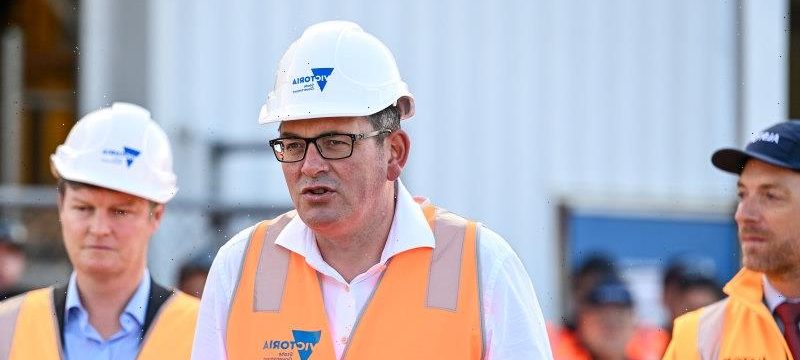Talking points
- With Victoria shedding a number of its long-running COVID-19 restrictions this comiing weekend, attention has turned to when the state will end the use of its pandemic declaration.
- The declaration was extended earlier this month and is now due to expire on July 12.
- Premier Daniel Andrews said on Thursday he hopes there will be no need to extend the declaration beyond that date, meaning all remaining restrictions would end at that time.
Premier Daniel Andrews intends to end the pandemic declaration in July and scrap all remaining COVID-19 restrictions, as Victoria prepares for sweeping changes to the rules to take effect on Friday.
Just five months after the controversial legislation sparked daily protests on the steps of Parliament and a marathon debate inside the building, Andrews said on Thursday he hoped to allow the pandemic declaration to expire when current powers ended on July 12.
Premier Daniel Andrews speaks to media on Thursday.Credit:Joe Armao
“I certainly hope so,” he said on Thursday.
“I don’t know what expert advice I’m going to get in the days leading up to the 12th of July. It’s my hope that we don’t need that, or we see something less than that, or we need some other arrangement. That’d be terrific.”
Under the state’s pandemic-specific legislation, the premier of the day is responsible for declaring a pandemic while the health minister executes public health orders based on publicly available advice.
Andrews extended the pandemic declaration for three months earlier this month.
Andrews said Victoria’s high vaccination rates allowed the state to make significant concessions in the management of COVID-19. So far, 94.5 per cent of people aged over 12 have had two doses of a vaccine and 67.1 per cent of adults have had three booster shots.
If the premier extended the pandemic declaration for three months beyond July, it would run into the November election campaign.
The Age last week foreshadowed the powers expiring in July.
The new pandemic-specific legislation made Victoria the only jurisdiction in Australia with tailor-made laws to tackle pandemics.
The bill was broadly welcomed for shifting power away from an unelected bureaucrat – the chief health officer – onto elected representatives, but debate was fraught, sparking angry daily protests on the steps of Parliament and a toxic debate.
It passed on December 2 after a 21-hour debate in the upper house.
On Wednesday, Health Minister Martin Foley announced sweeping changes to the rules which will come into effect on Saturday.
Key changes include:
- Patrons don’t need to have two doses or to prove their vaccination status to enter a venue;
- Masks no longer required in schools, early childhood, hospitality, retail venues or any event;
- Close contacts no longer have to quarantine, provided they wear a mask indoors and avoid sensitive settings, and have five negative rapid tests over seven days;
- All visitor restrictions in hospitals will be removed, except for mask requirements;
- Events with more than 30,000 people will no longer require public health pre-approval;
- International travellers who are symptom-free will not be required to test on arrival, and unvaccinated travellers will no longer have to quarantine for seven days. Pre-departure tests for unvaccinated air crew will also be lifted;
- People will be exempt from testing or quarantine for 12 weeks if they’ve had COVID-19;
- Individuals will need to notify their workplace contacts, in addition to informing their social contacts if they test positive, but workplaces won’t have to individually identify and notify exposed workers.
Stay across the most crucial developments related to the pandemic with the Coronavirus Update. Sign up for the weekly newsletter.
Most Viewed in Politics
From our partners
Source: Read Full Article

